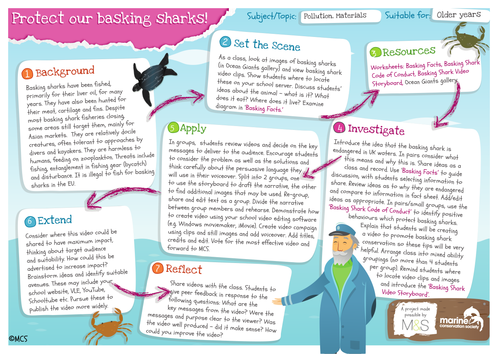21Uploads
4k+Views
2k+Downloads
Understanding the world

Litter in the environment
Using this lesson, students will experience litter in the environment first-hand by taking part in a litter survey.
Results will then be analysed, looking at the sources and properties of litter, considering how it could reach the sea, and learning how impacts the environment.
Includes fact file to support teaching, activities, survey worksheet, health and safety guidance, and links to follow-up learning.
Linked to national curriculum in England, Curriculum for Excellence in Scotland, Curriculum for Wales, and Eco-Schools topics.
Lesson 4 in Marine Litter series: https://www.mcsuk.org/what-you-can-do/fun-learning/primary-learning/teaching-resources/ks2-p7/marine-litter/#4-litter-in-the-environment

Protect Our Basking Sharks
Suitable for: Key Stage 2
Timing: This Learning Outline is designed to be split into several lessons depending on the age and ability of students as well as the length of lessons.
Curriculum Links:
English - Talking and Listening, Reading
Computing
Science
About the activity
An introduction to the biggest fish in our sea and the second biggest in the world, the Basking Shark. Students will use resources from our Cool Seas Explorer Centre Online classroom (Ocean Giants section) available at www.mcsuk.org/coolseas, to investigate why Basking Sharks are endangered. In groups they will then produce a short film using digital software (e.g. Windows Moviemaker, iMovie) to promote Basking Shark conservation. The best video should be shared with MCS at education@mcsuk.org with details of the class and school. If possible student films should also be shared on school social media pages to share the learning with a real audience.
For other free teaching resources visit www.mcsuk.org/coolseas.

Artivism
Artivism is the practice or idea of taking social, environmental or political action through art.
In this lesson, students will see how environmental artists have used art to raise awareness of marine litter, and create an artivism piece to raise awareness amongst your school and local community of the issue.
Includes fact file to support teaching, Artivism presentation with artist images, activities, and links to follow-up learning.
Linked to national curriculum in England, Curriculum for Excellence in Scotland, Curriculum for Wales, and Eco-Schools topics.
Lesson 6 in Marine Litter series: https://www.mcsuk.org/what-you-can-do/fun-learning/primary-learning/teaching-resources/ks2-p7/marine-litter/#campaigns

The plastic plague
Plastic waste impacts our marine environment in a number of ways.
In this lesson, students will sort litter items into their raw materials, look into properties and degradation times of various litter items and consider the effects this has on the environment.
They’ll also create a fair test, develop a hypothesis, observe changes, record date and draw conclusions.
Includes fact file to support teaching, Litter Timeline activity, investigation worksheet, and links to follow-up learning.
Linked to national curriculum in England, Curriculum for Excellence in Scotland, Curriculum for Wales, and Eco-Schools topics.
Lesson 3 in Marine Litter series: https://www.mcsuk.org/what-you-can-do/fun-learning/primary-learning/teaching-resources/ks2-p7/marine-litter/#3-the-plastic-plague

Litter campaign: Unflushables
This lesson focuses on the many problems wet wipes and other items cause when flushed down the toilet - the ‘unflushables’.
Students will conduct an experiment focusing on materials and their properties, going on to create a campaign for change in their school or community.
Includes fact file to support teaching, image reel, activities, and links to follow-up learning.
Linked to national curriculum in England, Curriculum for Excellence in Scotland, Curriculum for Wales, and Eco-Schools topics.
Lesson 1 in Litter Campaigns series: https://www.mcsuk.org/what-you-can-do/fun-learning/primary-learning/teaching-resources/ks2-p7/marine-litter/#campaigns





